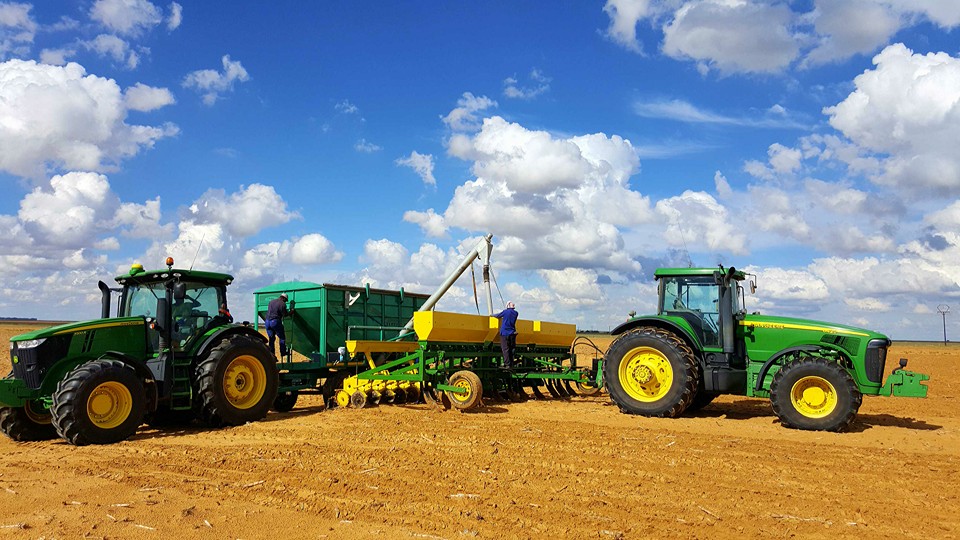Wees só voorbereid vir misdaad in feesseisoen
4
December
Dit is ’n gegewe dat ernstige geweldsmisdade, wat plaasaanvalle en eiendomsverwante misdade insluit, geneig is om tydens die feesseisoen toe te neem. Daarom is dit van kardinale belang dat landbouers, hul families, asook werkers of bewoners op plase en kleinhoewes, na veiligheidsmaatreëls of -wenke moet kyk om hul veiligheid te verbeter en sodoende misdade te help voorkom. Só sê dr Jane Buys, Veiligheidsrisiko-analis van Vrystaat Landbou (VL).
“Die VKB Veiligheidslessenaar van VL doen ’n beroep op alle landbouers, hul families en bewoners op plase, ongeag of hul lede van georganiseerde landbou is, om by ’n veiligheidsnetwerk of -stelsel in te skakel om sodoende pro-aktief na hul eie veiligheid om te sien,” sê sy.
Volgens haar is dit beter om voorkomend op te tree. VL wil ook landbouers se aandag vestig op die onwettige jag met honde wat ook in die feesseisoen kan toeneem en dat plase wat inisiasieskole huisves goed gemonitor moet word. Laasgenoemde kan ’n bydraende omgewing skep vir sekere eiendomsverwante diefstal soos veediefstal.
Let op die volgende basiese veiligheidsmaatreëls vir landbougemeenskappe:
In die mikro-omgewing (in en om die huis): Maak seker dat veiligheid eers by jouself begin. Beveilig jou huis met die nodige veiligheidshekke, slotte en diefwering voor vensters. Hou veiligheidshekke altyd gesluit en moenie dat sleutels ongekontroleerd rondlê nie (pas sleutelbeheer toe). Vervang sleutels van veiligheidshekke as sleutels wegraak. Moenie sleutels onder deurmatte of in potplanthouers wegsteek nie. Haal sleutels uit voertuie en trekkers as dit nie gebruik word nie. Verseker dat gevaarlike wapens soos byle, grawe, pikke, koevoette en lere toegesluit word wanneer dit nie gebruik word nie.
Pas toegangsbeheer toe deur, waar moontlik, afstandbeheerde hekke te installeer wat nie deur struike of bosse versper word nie. Installeer “trail cameras” waar moontlik wat enige beweging in die direkte omgewing rondom jou huis optel en na jou selfoon stuur.
Vreemdelinge moet hulself duidelik identifiseer voor daar met hulle in gesprek getree sal word. Moenie jou huis verlaat wanneer honde snags blaf nie, selfs wanneer jou krag afgeskakel word. Kontak jou bure, die plaaswag of netwerk vir hulp.
Pas toegangsbeheer tot jou eiendom toe deur nie leegleêry van werklose persone toe te laat nie. Installeer waar moontlik ’n veiligheidshek binne jou huis. ’n Hond of honde wat binne jou huis slaap word ook aanbeveel.
Wanneer jy tuiskom, moenie dadelik in die huis inbeweeg nie. Inspekteer die area rondom jou huis om te bepaal of geforseerde toegang bekom is (dis nou indien jy nie ’n alarm het nie). Kyk uit waar jou honde is en wat hul gedrag is.
Wat indiensneming betref, moenie onwettige immigrante in diens neem nie. Moenie betrokke raak by onwettige handel met burgers van ’n buurland nie. Hou behoorlike rekord van werkers en bewoners op plase. Lei werkers op en maak hulle deel van gebeurlikheidsplanne om sodeoende bedag te wees op verdagte persone en voertuie wat sonder rede in area rondbeweeg. Handhaaf goeie verhoudinge met werkers en bewoners op plase. Bekom sodoende vooraf-inligting rakende moontlike misdade in jou onmiddellike omgewing.
In die makro-omgewing, maak seker dat jy Agri SA se Plaasprotokol-borde by die ingang van jou plaas aangebring het.
Skakel in by veiligheidstrukture tussen die Suid-Afrikaanse Polisiediens (SAPD), landbouers en plaaswagte in jou area. Raak betrokke by die Landelike Beveiligingstrategie (LBS) in jou area deur aksies soos gereelde wit- en blou-lig patrollies en weet wie die veiligheidskoördineerder van die SAPD en VL (georganiseerde landbou) in jou area is. Raak dus deel van veiligheid “WhatsApp” groepe wat pro-aktiewe inligting deurgee.
Bekom radiokommunikasie met plaaslike radionetwerk. Toets gereeld radiokommunikasie onder die LBP in jou area. Skakel ’n addisionele selfoon aan wat op ’n strategiese plek binne die huis geplaas word en maak seker dit is altyd gelaai. Wees verder gekoppel aan verdere noodseingroepe byvoorbeeld die selfoontoepassing genaamd Die Plaaswag. Kontakbesonderhede en noodnommers van bure, die SAPD en veiligheidskoördineerders moet altyd byderhand of op selfone gelaai wees.
Rapporteer en skakel enige inligting wat verband hou met ’n misdaad aan die SAPD en veiligheidskoördineerder in jou area. Die onverklaarbare dood van ’n waghond moet as ’n waarskuwingsteken gesien word.
Volgens Buys kom groter veiligheid op landbougrond neer op vyf kern elemente. Dit is die verbetering van verhoudinge in die mikro- en makro-omgewing tussen alle belanghebbendes, om te verseker dat kommunikasienetwerke in plek is om sodoende hulp te ontbied wanneer daar ’n nood is en die betrokkenheid en inskakel by veiligheidstrukture of netwerke in jou onmiddelike omgewing (binne die LBP). Dan maak die gereelde deurgee en skakeling van inligting oor misdaad-aktiwiteite en verdagte persone of voertuie na veiligheidstrukture of netwerke, asook die bemagtiging van kennis en inligting om sekere krisissituasie binne die raamwerk van bestaande wetgewing reg aan te spreek ook deel hiervan uit.
“Dit alles kom daarop neer dat landbouers hul paraatheid moet opskerp, moet waarneem wat hulle in hul onmiddellike omgewing sien en nie enige aktiwiteite of beweging as gering moet ag nie en dit moet deurgee,” sê Buys. “Hou jouself, jou familie en werkersmag veilig.”
It is a fact that serious violent crimes, including farm attacks and property-related crimes, tend to increase during the feast season. It is therefore of paramount importance that farmers, their families, workers or residents on farms and smallholdings, should follow safety measures or tips to improve their safety and help prevent crimes. This is according to Dr Jane Buys, Safety and Risk Analyst at Free State Agriculture (FSA).
“The VKB Safety Desk of FSA appeals to all farmers, their families and residents on farms, regardless of whether they are members of organized agriculture, to be part of a safety network or system in order to proactively look after their own safety,” she says.
According to her, it is better to act preventively. FSA also wants to draw the attention of farmers to the illegal hunting with dogs that can also increase during the festive season and that farms hosting initiation schools must be monitored properly. The latter can create a contributing environment for certain property-related theft such as stock theft.
Note the following basic safety measures for agricultural communities:
In the micro environment (in and around the house): Make sure that safety starts with yourself. Protect your home with the necessary security gates, locks and burglar bars for windows. Keep security gates always locked and do not leave the keys unchecked (apply key management only). Replace keys for safety gates if keys are lost. Do not hide keys underneath doormats or in pot plant containers. Remove keys from vehicles and tractors if not used. Ensure that dangerous weapons such as axles, shovels, picks, crowbars and ladders are locked when not in use.
Apply access control by installing remote-controlled gates, which are not blocked by shrubs or bushes, where possible. Install trail cameras wherever possible to pick up any movement in the direct environment around your home to send them to your mobile phone.
Unknown people must be identified before conversing with them. Do not leave your house when dogs bark at night, even when your power is turned off. Contact your neighbours, the farm guard or network for assistance.
Apply access control to your property by not allowing jobless people to lie around on the farm. If possible, install a security gate inside your home. A dog or dogs sleeping in your house is also recommended.
When you come home, do not go into the house immediately. Inspect the area around your home to determine whether access was forced (that is if you do not have an alarm). See where your dogs are and what their behaviour is like.
When it comes to employment, do not employ illegal immigrants. Do not get involved in illegal trade with citizens of a neighbouring country. Keep proper record of workers and residents on farms. Lead workers and make them part of contingency plans to be careful about suspicious persons and vehicles moving around in the area. Maintain good relationships with workers and residents on farms. Get information beforehand about possible crimes in your immediate environment.
In the macro environment, make sure you put up Agri SA’s Farm Protocol signs at the entrance of your farm.
Be part of safety structures between the South African Police Service (SAPS), farmers and farm guards in your area. Get involved with the Rural Safety Strategy (RSS) through actions like regular white and blue light patrols and know who is the SAPS and FSA (organized agriculture) safety coordinator in your area. Therefore become part of a safety “WhatsApp” groups that pass on proactive information.
Get radio communication with a local radio network. Regularly test radio communications under the RSS in your area. Connect an additional cellphone that is placed in a strategic location inside the house and make sure it is always charged. Also be linked to further emergency call groups, for example, the mobile phone application called Die Plaaswag. Contact details and emergency numbers of neighbours, the SAPS and safety coordinators must always be nearby or saved on mobile phones.
Report and link any information related to a crime to the SAPS and safety coordinator in your area. The unexplainable death of a watchdog must be seen as a warning sign.
According to Buys, greater safety on agricultural land is dependant on five core elements. They are improving relationships in the micro and macro environment among all stakeholders to ensure that communications networks are in place to call for assistance when there is an emergency and involvement and linking to safety structures or networks in your immediate environment (within the RSS). The regular giving through and liaison of information about crime activities and suspicious persons or vehicles to safety structures or networks, as well as the empowerment with knowledge and information to address certain crises within the framework of existing legislation, are also part of this.
“Everything comes down to farmers improving their readiness, they must observe what they see in their immediate environment and should not consider any activity or movement as too small or irrelevant,” Buys said. “Keep yourself, your family and workforce safe.”



